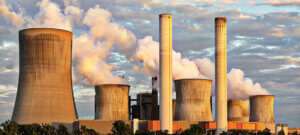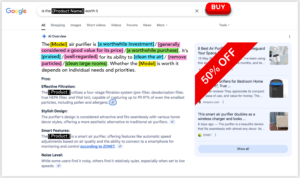If you don’t have time to read this full article, here’s a summary of what we will cover:
- Ionizers can slightly improve the efficiency of mechanical air filtration of HEPA and activated carbon filters, boosting the ability of the unit to remove particulate matter and odors from your environment.
- Unfortunately, they do this by generating and releasing negative ions into the air, which can produce a harmful gas called ozone and also increase small particulate matter (PM2.5) levels along the way.
In this article, we’ll dig deeper into what an air ionizer is, its potential harm and its limitations.
Ready to learn more? Let’s get to it!
What does an air ionizer do?
For this one, you’ll have to think back to your high school chemistry lessons.
Ions are so minuscule that they’re invisible to the human eye. Nevertheless, they’re all around us, floating in the air.
Remember particles and molecules? They’re all made up of ions, which can have either positive (cation) or negative (anion) charges. Negative ions (anions) become negative when they gain an electron, whereas positive ions (cations) become positive when they lose an electron.
Unlike an air purifier, which works by filtering through a series of finer and finer filters, an air ionizer generates negative ions, which are then released into the surrounding air.
These are then attracted to positive particles in your atmosphere, such as cigarette smoke. This creates an electric charge, which causes the particles to stick together.
Once stuck together, they land on surfaces around you. This can include your ceiling and walls, floors and tabletops and furnishings, such as curtains, rugs and carpets.
These clumped-together particles can then be removed and cleaned away. Sometimes, the ionizer will have metal plates built-in, which collect the particles for you. You will, however, need to wipe these down from time to time.
Are you still with me?
Now that you understand how ionizers work, let’s go over some research about their air cleaning efficiency and the effects they can have on our health.
The pros and cons of air ionizers
While ionizers can be beneficial, they can’t completely clean up your environment.
Let’s get into the pros and cons:
Air ionizer pros
Air ionizer cons
– Irritation of the throat
– Chest pains
– Coughing and shortness of breath
– Breathing difficulties
HouseFresh doesn’t recommend air ionizers

However, ionizers can generate ozone, VOCs and nitric oxide, leading to many health problems. That is why we do not recommend air purifiers that use this technology to anybody with respiratory issues or serious illness.
In our opinion, ionizers are not worth any risk when HEPA and activated charcoal don’t create chemical byproducts and work exceptionally well at removing harmful particles and gases from the air.
That being said, there are many good air purifiers on the market with ionization technology that can be turned on and off (such as the Winix 5500-2) for those who want to supercharge the air-cleaning performance of their units in specific situations but who prefer not to have an ionizer running in the background all the time.”
SOURCES
- Biggers, A. (2021). How Does An Air Purifier Work? healthline.com
- Comini, S et al. (2021). Positive and Negative Ions Potently Inhibit the Viability of Airborne Gram-Positive and Gram-Negative Bacteria. ncbi.nlm.nih.gov
- Jiang, S et al. (2018). Negative Air Ions and Their Effects on Human Health and Air Quality Improvement. ncbi.nlm.nih.gov
- Perez, V. (2013). Air Ions And Mood Outcomes: A Review And Meta-Analysis. ncbi.nlm.nih.gov
- Taylor-Smith, K. (2021). Air Purifiers Vs Ionizers: What’s The Difference? livescience.com
- United States Environmental Protection Agency. What are ionizers and other ozone generating air cleaners? epa.gov
- Wallace, L.A. (2008). Effectiveness of Home Air Cleaners in Reducing Indoor Levels of Particles. researchgate.net
- Waring, M.S et al. (2008). Ultrafine Particle Removal And Generation By Portable Air Cleaners. sciencedirect.com.





